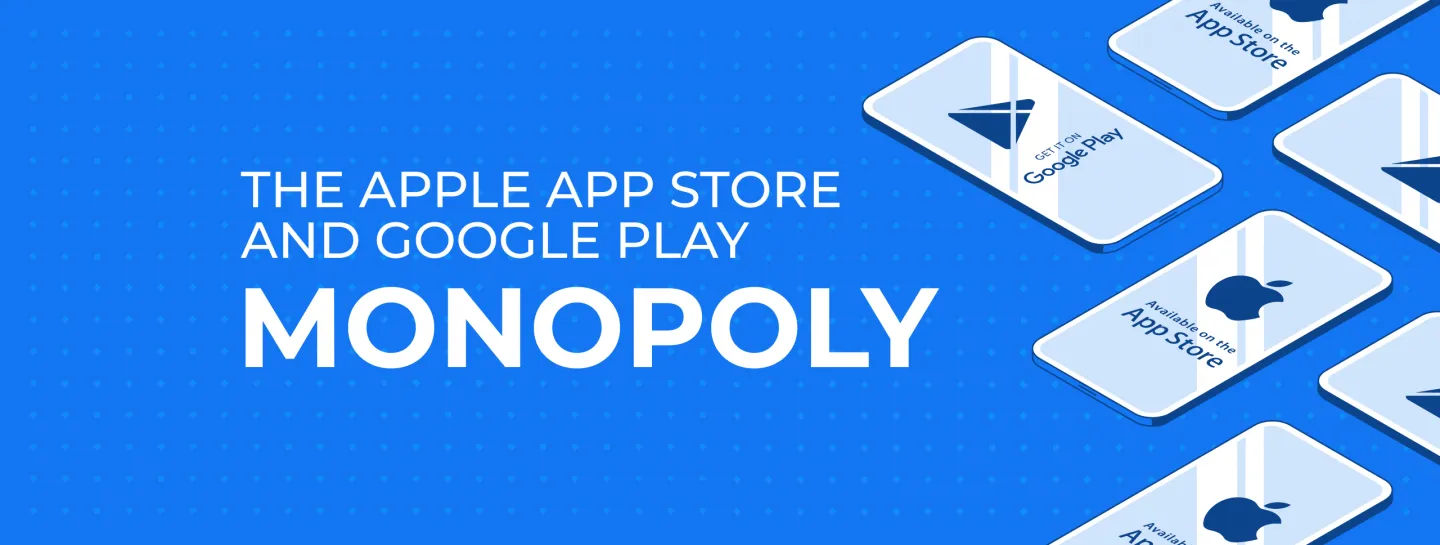
Why the Apple and Google app store monopoly?

No doubt that the Apple and Google corporations still have fast hold of their predominant position on the app market, but the latest discussion at the legal level could call into question their monopoly. Soon, on opposite sides of the ocean, both in the EU and the U.S., Big Tech might be under control. The Digital Markets Act (DMA) established by the European Commission is supposed to be adopted in spring 2023 and is waiting for final approval. It will change familiar ways of doing business, such as the ban on installing third-party apps for Apple users. Definitely, it will raise an objection from the company’s side as the security and privacy of the devices is based on the restricted access to the system.
In February, the Senate Judiciary Committee of the U.S. approved a bill allowing app sideloading that weakens the power of the two tech behemoths. Still, the bill needs to win votes in the Senate and Congress. After all, Apple and Google will be beholden to allowing installation of apps from outside of the App Store market and Google Play, respectively. Moreover, users will be provided with all the available info about subscription prices directly from the developers and their alternative payment methods.
Multiple companies, ranging from small developers to huge companies like Spotify or Epic Games, complain about a shortage of transparency and accountability in their work with the Apple and Google markets. For example, Apple hid information about the cheaper Spotify subscription via the website.
In the UK, a £1.5 billion collective action suit was organized by developers against Apple’s “excessive” commission. For small developers, such a fee can be a death sentence: with app development expenses ranging on average between US $40,000 and US $300,000, sometimes it becomes impossible to profit. Moreover, a great injustice is being “sherlocked” by a big company: Apple or Google implement the features of the developed app into the operating system, thus making this app useless. This is seen as contributing to the reduction of innovation and health competition, according to the UK’s Competition and Markets Authority (CMA).
After the Epic Games case, even though the company lost in court, Apple and Google’s stores had to cut commissions from 30% to 15% for some developers and businesses.
If the discussed laws are passed, users will face a choice between privacy and freedom. But, everything comes at a price, doesn’t it? Some people need more security, while others prefer a bit of risk.
One more thing we shouldn’t forget about. During the flourishing period of Web3, it is reasonable to expect that the power of Big Tech will gradually pass to the internet users as a result of the blockchain technology and tokens. So, when the Internet changes to a decentralized system, big companies will lose their monopoly. But, it's not all that simple. Scott Galloway is working as a marketing professor at New York University's Stern School of Business. He claims that with blockchain technology the power will transfer from one controller hand to another, and that’s about it. He gives an example of Bitcoin, when “the top 2% of account addresses own 95% of the more than $800 billion supply of Bitcoin”. A similar opinion is expressed in Coinbase. They find it difficult to create a decentralized internet without the help of the centralized monopoly. One of the key problems is the App Store and Google Play Market listing rules. All blockchain apps have to comply with Apple and Google policies now, even if they have an ideology of decentralization. However, everything can change if the companies are forced to be more tolerant of sideloading.
While developing mobile apps and websites, Magora team is scrupulous about meeting clients’ demands as well as doing technical parts at its best. We are ready to catch the changing and high standards of the market.





